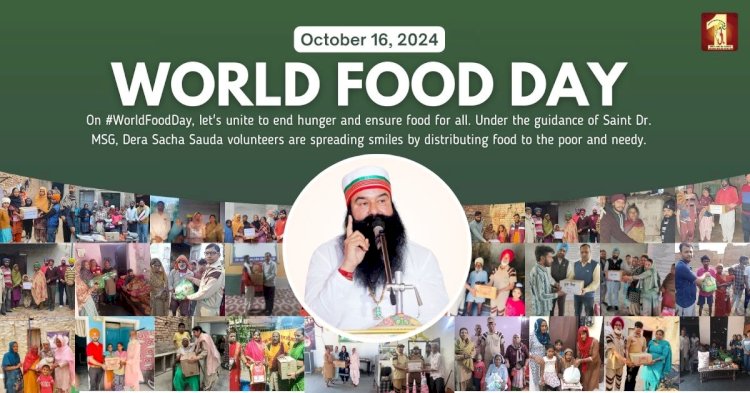Hunger-Free Hearts, Hope-Filled Futures: World Food Day 2024
In Islam, it's written that those who pray while disregarding their hungry neighbors gain nothing. Similarly, Christianity teaches love for neighbors, including helping the poor. Yet, food insecurity persists. World Food Day, October 16, commemorates the UN Food and Agriculture Organization (FAO) founding in 1945. The 2024 theme is "Right to Food for a Better Life and a Better Future," aiming for zero hunger by 2030.
Global Hunger Index
The Global Hunger Index (GHI) ranks India 105th out of 127 countries, with a "serious" hunger level. Little progress has been made since 2016, and achieving zero hunger by 2030 seems grim. Currently, 42 countries still experience alarming or serious hunger.
REASONS FOR FOOD INSECURITY
The Devastating Effects of Climate Change
Climate change exacerbates food insecurity in several ways:
- Rising temperatures and changing precipitation patterns affect agricultural productivity.
- Increased frequency of natural disasters destroys crops and disrupts food distribution.
- Changes in weather patterns impact water availability, further straining food production.
Economic Factors
1. Poverty: Limited financial resources to purchase food.
2. Unemployment: Lack of stable income affects food access.
3. Inflation: Rising food prices reduce purchasing power.
4. Debt: Financial burdens limit food expenditures.
Social Factors
1. Conflict and Displacement: War, refugee crises, and displacement disrupt food systems.
2. Gender Inequality: Women's limited access to resources, education, and economic opportunities.
3. Ethnic and Cultural Marginalization: Exclusion from food systems and resources.
4. Aging Population: Elderly individuals' limited mobility and access to food.
Environmental Factors
1. Climate Change: Weather patterns, droughts, and floods impact food production.
2. Water Scarcity: Limited water resources affect crop yields.
3. Soil Degradation: Decreased fertility and productivity.
4. Biodiversity Loss: Reduced crop and animal diversity.
Demographic Factors
1. Population Growth: Increasing demand for food.
2. Urbanization: Changes in food consumption patterns.
3. Migration: Shifts in food availability and access.
4. Aging Population: Changes in dietary needs.
Health Factors
1. Malnutrition: Undernutrition, micronutrient deficiencies.
2. Food-Borne Illnesses: Contamination, spoilage.
3. Dietary Restrictions: Limited access to specialized foods.
4. Mental Health: Stress, anxiety impact food security.
Infrastructure Factors
1. Transportation: Limited access to markets, food distribution.
2. Storage: Inadequate facilities, food spoilage.
3. Irrigation: Insufficient water management.
4. Communication: Limited access to information on food availability.
Technological Barriers
1. Limited access to technology for farmers
2. Insufficient digital infrastructure for food distribution
3. Lack of data analysis for optimized food production
4. Inadequate online platforms for foo
Starvation and Its Consequences
Daily, 25,000 people die from hunger, including 10,000 children. Hunger is the world's biggest health problem, and climate change exacerbates food insecurity. Starvation is a slow and cruel death that usually results in infection or tissue breakdown.
Hunger's far-reaching consequences:
- Malnutrition affects cognitive development and educational performance.
- Hunger reduces productivity, hindering economic growth.
Food Waste: A Growing Concern
India wastes 74 million tonnes of food annually. To prevent waste, consider the following:
- Buy only what's needed
- Avoid unnecessary cooking
- Store leftovers
- Reuse leftovers
Why Should We Care?
While many enjoy luxuries, others struggle to afford meals. People go to bed hungry, worrying about their next meal. We can help. As humans, we're wired to sympathize with others and are fully capable of helping.
If you're fortunate enough to have a roof over your head, enjoy three meals a day, and have clothes to wear, you're well-positioned to make a positive impact on those in need. If you genuinely desire to help, there are countless ways to do so
Getting Involved
Join the movement by supporting organizations working towards food security and participating in local events.
Dera Sacha Sauda: Making a Difference
Dera Sacha Sauda, a socio-religious organization, has been tirelessly working towards eradicating hunger. With 68 million followers, they've initiated various welfare projects. Their Food Bank initiative operates under the objective "May no one go with an empty stomach."
Key initiatives include:
- Once a week fast: Followers donate food they would have eaten during weekly fasts to help families in need.
- Monthly ration kits: Followers donate monthly ration kits to support families.
- Crisis aid: Dera Sacha Sauda sends aid to affected communities worldwide during crises like floods, droughts, or other calamities.
- Food distribution: They distribute food to the needy, promoting self-sustainability.
- Global reach: Their initiatives extend worldwide, helping countless individuals.
Saint Dr. MSG leads Dera Sacha Sauda's humanitarian efforts, inspiring millions. Their work serves as a shining example of community-driven change.
Final Thoughts
As we reflect on global hunger, let's acknowledge progress and challenges. World Food Day reminds us of our shared responsibility. Let's work together, driven by compassion, innovation, and determination, until zero hunger becomes a reality.
Stay committed, stay informed, and together, let's build a world where food is a fundamental right, not a privilege.












